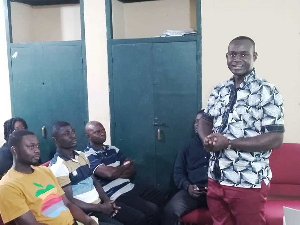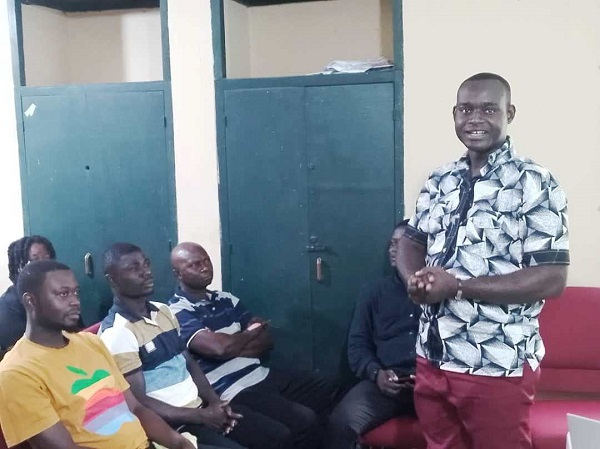 Antwi Hakeem Abdul, DCE of Birim North District Assembly
Antwi Hakeem Abdul, DCE of Birim North District Assembly
The District Chief Executive (DCE) of the Birim North District Assembly, Antwi Hakeem Abdul, has commended the Integrated Social Development Centre (ISODEC) for its efforts in empowering citizens to actively participate in local governance and promoting accountability.
“I am happy ISODEC has come with this project,” he stated. “This kind of engagement gives us a lot of enlightenment. We, as community members, have a role to play in addressing our own development challenges.”
Hakeem Abdul made these comments at a Capacity Building Workshop for Accountability Labs (ALs) held at the Birim North District Assembly in the Eastern Region.
The Accountability Labs, drawn from over eleven communities within the Assembly, are expected to use the knowledge they have gained to advocate for and influence policies and practices in the extractive sector, particularly in mining communities.
The training was organised by ISODEC under the Voice, Influence and Inclusive Development (AVID-2) project, with support from the STAR-Ghana Foundation.
According to the DCE, the programme serves as a vital platform for identifying and addressing key challenges facing the communities, particularly youth unemployment, which was identified during ISODEC’s earlier needs assessment in several communities within the Assembly.
Hakeem Abdul acknowledged the growing demand for jobs among the youth in the area, revealing that he receives numerous job applications daily.
“We know that the youth need jobs. I have a lot of applications on my desk seeking employment. We are having sleepless nights as a result of youth unemployment,” he lamented.
He added that the Assembly had already made arrangements to address some of the problems facing the communities.
“This programme will help us a lot, as we are able to identify the problems,” he said.
He expressed optimism that initiatives like ISODEC’s could play a critical role in equipping young people with the knowledge and confidence to demand accountability.
He thanked the youth for their active participation and commended ISODEC for bringing the initiative to the Assembly.
In his response, Bernard Anaba, Head of Policy and Programmes at ISODEC, expressed appreciation to the DCE for attending the workshop.
Anaba noted that while the project aims to empower communities and citizens to demand accountability and improved services from duty bearers, it also seeks to build the capacity of mining communities to mobilize and demand water as a right.
He encouraged participants not to keep the knowledge to themselves, but to share it with other members of their communities.
The District Planning Officer, Audrey Sandra Arkon, who fully participated in the event, encouraged attendees to take the training seriously.
“Everything that has been taught should be taken seriously. I am particularly pleased with this engagement; I even feel it’s more impactful than attending a local government school,” she remarked.
Michael Tettey, a volunteer with ISODEC, led a discussion on citizen participation in local governance processes, including the functions of the Client Service Unit, the procedure for submitting petitions, and the role of the Public Relations and Complaints Committee (PRCC).
Boakye Mark, Assembly Member for the Akoase Ahembronum Electoral Area, also encouraged participants to unite and work collaboratively for the development of their communities.
At the end of the workshop, an eight-member committee was established and tasked with addressing key needs identified through a pairwise ranking exercise.


